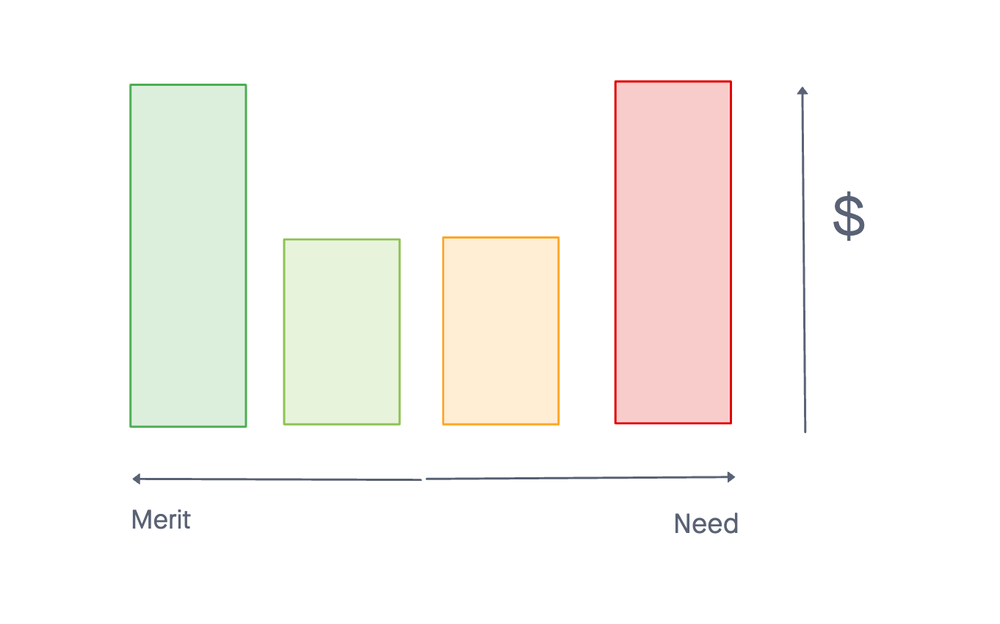This is a tricky post to write. Both because it's so interesting and necessary, but also because it is so sensitive.
We all needs things. Some just need more love or attention, some need food or shelter, some need money, and so on.
The question is how should we deal with other people's needs.
Christian society has told us that other people's needs matter. That they matter a lot. it's the core of Charity.
For example, I just spent ten days learning about migration and asylum seekers. European society has a built-in law that says that if someone needs protection (an asylum seeker), they have a right to it. It isn't a privilege we give them, it's a right they can claim.
That's why it's so important for migrants to get on EU soil: before that they have absolutely no rights and we (Frontex and so on) try to prevent them from reaching us, but once they do, once they touch EU land, they have rights and we can't send them back anymore before going through the whole asylum seeker process.
This is a very straightforward and written-in-law case of someone's needs giving them a claim over our ressources and time but in many cases (beggers, suffering people in other countries, victims, ...) it isn't so clear and we have to develop our own morality for those cases.
For example, if someone asks you for money on the streets, what is the right thing to do?
The Cambridge dictionary defines charity as "help, especially in the form of money, given freely to people who are in need". Given freely is the key element for me. You are not expecting anything in return, you do it out of charity (else it would be trade/exchange).
Doing things without expecting anything in return is generally a bad idea. No one works without expecting to be paid, or gives money to a bartender without expecting a drink in exchange.
We don't just walk by our favourite restaurant and give the owner a $10 bill for nothing. But if the owner isn't an owner anymore but a begger on the street, that behaviour is acceptable again.
As you can tell, I'm not a big fan of the concept of charity but where I get really concerned is if you take the logic to it's finality.
We all have a sort of "hierachy of neediness" in our minds. The begging child is more in need than the adult begger. The sick adult is more in need than the healthy adult, and so on.
So in order to be coherent, the more someone is in need, the more you should give. Or to put it the other way, the less someone is in need, the less you should give.
That's why high-performing students (looking at you Study Foundation) have a harder time raising money for their needs than charities helping sick baby animals.

Just look at it...
And since there is an infinity of people who are more in need than you, shouldn't you give everything?
Isn't it interesting that we're willing to pay more for a great restaurant than an average restaurant, but then again willing to give more money to the very poor restaurant owner who went bankrupt than the average poor restaurant owner who's barely making ends meet?

It seems like we're living according to two different codes, two principles and that the two are not compatible at all: Merit and Charity.
- Merit is giving to someone who deserves it (a great chef)
- Charity is giving to someone who doesn't deserve it (a terrible chef who no-one is willing to hire)
Now this is where it becomes morally painful to argue in favor of a meritocracy: life is unfair, some people get lucky, some people don't. Some people aren't given a chance.
I recently saw a short movie about an immigrant food delivery driver in Italy. The point of the movie was to illustrate all those little tough moments he had to go through and to make us feel compassionate towards his situation, and it worked of course.
The thing is that merit is not given based on how much you worked (aka. suffered), but on the output (the food, service, product, value, ...) you produced.
Charity on the contrary is given specifically based on how much you suffered, non depending of what you produced. In fact if you suffered a lot but made it, then you do not deserve any charity at all. But the person who suffered exactly as much as you did, deserves it, exactly because she did not make it.
I'm rambling on but the point I'm making it becoming clear: the morality of charity does not work and is irrational, unfair and unjust.
'Giving' per say is not a problem. I can give to my children or my parents or my friends and while I might not expect to receive the money back, I can expect it in other forms: gratitude, help, time, love, whatever.
But giving without expecting anything in return is incoherent, never acceptable and leads to the situations described before.
A victim, complaining about how unfair life is because he didn't get a chance is a sad and terrible sight.
But a hard working person who husstled through and barely made it, getting rewarded less than the victim is the most untolerable sight I can image.
Tldr;
When you give something to someone who doesn't deserve it, you're comitting a terrible sin, because you took away from someone who did deserve it.
- would you tip a horrible waiter?
- give a great review to a bad restaurant?
- would you hire the worst applicant?
That's an easy one of course. But imagine if you did. How would those people feel? How would their image of the world change? Their respect for you?
- would you tip a horrible waiter if he really needs it?
- give a great review to a bad restaurant if they absolutely need it?
- would you hire the worst applicant if he really needs the job?
Your answer should be exactly the same than to the previous question, yet, it isn't. Now I'll start hearing: "well it depends on the situation" and so on. Why?
Be careful not to make that mistake. In any trade, it's about giving and receiving. What the other person needs has nothing to do with the trade and if you start considering needs outside of the trade happening, you'll destroy your reputation and the trust other humans (traders) have in you.
If you give your apples for free to the poor but sell them for a lot to rich people, who will buy from you? No one. And one day you won't have any apples to giveaway anymore.
